What is inflammatory bowel disease?
Inflammatory bowel disease (IBD) is a group of chronic conditions that cause inflammation in your digestive tract. This ongoing inflammation can lead to symptoms like belly pain, diarrhea, fatigue and weight loss. IBD is different from irritable bowel syndrome (IBS), which does not cause inflammation or damage to the digestive system.
The two main types of IBD are Crohn’s disease and ulcerative colitis: Test
- Crohn’s disease can affect any part of your digestive tract, from your mouth to your anus. It often causes patches of inflammation that can extend through multiple layers of the bowel wall.
- Ulcerative colitis primarily affects the colon and rectum. It causes continuous inflammation and sores or ulcers in the innermost lining of the large intestine.
IBD is a lifelong condition with no cure. But treatments can help manage symptoms and allow you to live a full life.
Inflammatory bowel disease symptoms
Inflammatory bowel disease can cause a range of symptoms that may come and go over time. Many people experience “flares,” when symptoms get worse, followed by periods of remission when they improve or go away.
Your symptoms may vary based on the type of IBD you have and how much of your digestive tract is affected.
Common symptoms of IBD include:
- Stomach pain or cramping
- Diarrhea
- Urgent need to go
- Rectal bleeding
- Tiredness
- Unintended weight loss
- Fever
In kids and teens, IBD can also affect growth and development.
Some people with IBD may also notice symptoms outside their digestive system, such as:
- Pain or swelling in the joints
- Skin rashes or bumps
- Eye redness or discomfort
- Sores in the mouth
When to see a doctor
If you’re having ongoing digestive issues that disrupt your daily life, it’s important to talk with your primary care doctor or a gastroenterologist. Inflammatory bowel disease symptoms can be similar to other conditions, so getting the right diagnosis is key to finding relief and avoiding complications.
Early diagnosis and treatment can help reduce flares, protect your long-term health and improve your quality of life. Start by seeing a primary care provider, who can refer you to a digestive health specialist if needed.
Complications
Many people with inflammatory bowel disease live full, active lives. But without proper treatment, IBD can lead to complications that affect your health and quality of life.
Common complications of Crohn’s disease and ulcerative colitis include:
- Colon cancer: Long-term inflammation in the colon increases your risk. Regular colonoscopies help catch it early.
- Joint, skin and eye inflammation: Conditions like arthritis, skin rashes and eye irritation can occur during flare-ups.
- Medication side effects: Some IBD treatments may raise your risk for infections, bone loss or high blood pressure.
- Liver disease: A rare condition called primary sclerosing cholangitis (PSC) can cause liver damage.
- Blood clots: IBD increases your risk for clots in veins and arteries.
- Dehydration: Ongoing diarrhea can lead to fluid loss, especially during flares.
- Bone loss: Long-term steroid use may weaken your bones.
Crohn’s disease may also cause:
- Bowel blockage: Inflammation can narrow the intestines and require surgery.
- Malnutrition: Poor absorption and appetite can lead to vitamin deficiencies and weight loss.
- Fistulas and anal fissures: Inflammation can cause abnormal connections or tears in the tissue.
Ulcerative colitis may also cause:
- Toxic megacolon: A rare condition where the colon swells dangerously.
- Perforated colon: A tear in the colon wall, sometimes linked to severe flares.
Early diagnosis, regular monitoring and a treatment plan tailored to your needs can help reduce the risk of complications.
How is IBD diagnosed
Diagnosing inflammatory bowel disease involves several steps. Your doctor will review your health history, perform a physical exam, order lab tests and imaging, and use endoscopy procedures to look inside your digestive tract. This helps find the cause of your symptoms and rule out other conditions.
Imaging
Imaging tests provide pictures of your digestive system to find inflammation, blockages or other issues:
- X-ray: Often done with a contrast dye that you swallow or receive via enema, these images highlight the intestines to show blockages, narrowing or abnormal shapes.
- Computerized tomography (CT) scan: These scans create detailed cross-sectional images of your abdomen to identify inflammation, abscesses (infection pockets) or complications such as fistulas.
Lab tests
Lab tests play an important role in diagnosing IBD and ruling out other conditions with similar symptoms:
- Blood tests: These check for signs of inflammation, anemia (low red blood cells), infections, and nutritional problems related to IBD. Markers like C-reactive protein (CRP) and erythrocyte sedimentation rate (ESR) show inflammation levels. Blood tests also evaluate liver and kidney function.
- Stool tests: These analyze your bowel movements to detect infections from bacteria, viruses or parasites that can mimic IBD symptoms. They also measure inflammation markers like calprotectin or lactoferrin released during intestinal inflammation.
Medical history and exam
Find specialized care for inflammatory bowel disease
At Baylor Scott & White, we offer several locations for the treatment of inflammatory bowel disease, including gastroenterology centers across North and Central Texas. Our experienced team is ready to provide personalized care to help improve your quality of life. Whether you're seeking diagnostic testing, treatment options or ongoing support, we are here to help you.
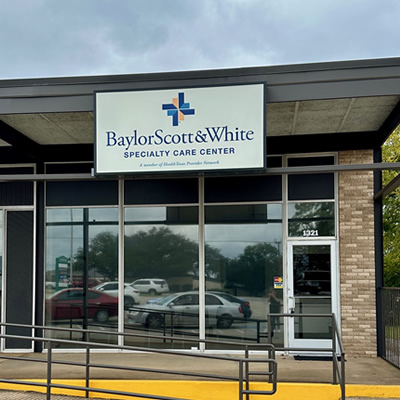
Baylor Scott & White North Texas Colon and Rectal Associates - Tyler
1321 S Beckham Ave , Tyler, TX, 75701
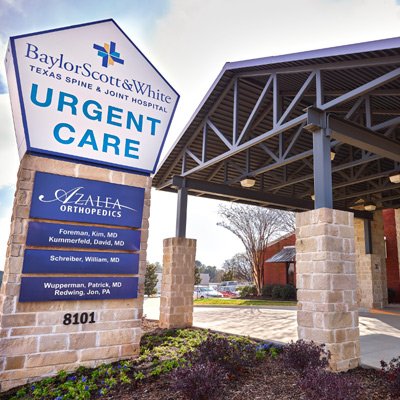
Baylor Scott & White Texas Spine & Joint Hospital Urgent Care - Tyler
8101 S Broadway Ave , Tyler, TX, 75703
- Monday: 8:00 am - 8:00 pm
- Tuesday: 8:00 am - 8:00 pm
- Wednesday: 8:00 am - 8:00 pm
- Thursday: 8:00 am - 8:00 pm
- Friday: 8:00 am - 8:00 pm
- Saturday: 8:00 am - 6:00 pm
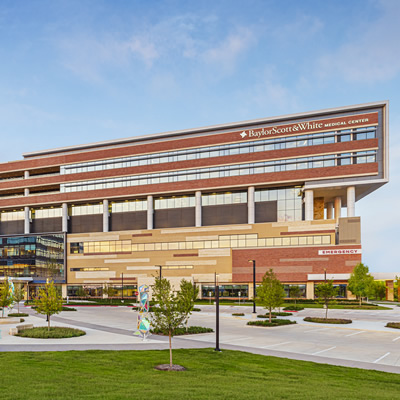
Baylor Scott & White Medical Center - Frisco at PGA Parkway
7600 Better Way , Frisco, TX, 75033
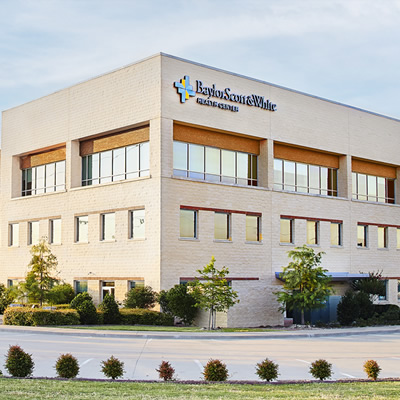
Baylor Scott & White North Texas Colon and Rectal Associates - North Garland
7217 Telecom Pkwy Ste 100, Garland, TX, 75044

Baylor Scott & White Urgent Care Center at The Star
3800 Gaylord Pkwy Ste 140, Frisco, TX, 75034
- Monday: 9:00 am - 8:00 pm
- Tuesday: 9:00 am - 8:00 pm
- Wednesday: 9:00 am - 8:00 pm
- Thursday: 9:00 am - 8:00 pm
- Friday: 9:00 am - 8:00 pm
- Saturday: 9:00 am - 8:00 pm
- Sunday: 9:00 am - 8:00 pm
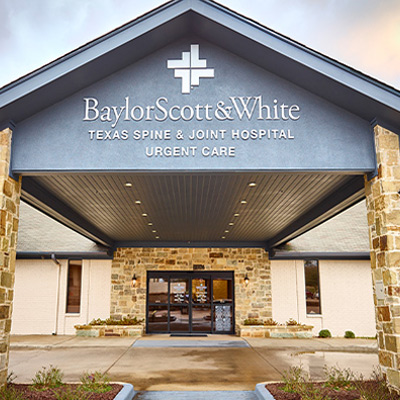
Baylor Scott & White Texas Spine & Joint Hospital Urgent Care - Palestine
2211 S Loop 256 , Palestine, TX, 75801
- Monday: 7:00 am - 7:00 pm
- Tuesday: 7:00 am - 7:00 pm
- Wednesday: 7:00 am - 7:00 pm
- Thursday: 7:00 am - 7:00 pm
- Friday: 7:00 am - 7:00 pm
- Saturday: 8:00 am - 6:00 pm

Baylor Scott & White Urgent Care - Lovers Lane
5800 E Lovers Ln , Dallas, TX, 75206
- Monday: 8:00 am - 8:00 pm
- Tuesday: 8:00 am - 8:00 pm
- Wednesday: 8:00 am - 8:00 pm
- Thursday: 8:00 am - 8:00 pm
- Friday: 8:00 am - 8:00 pm
- Saturday: 8:00 am - 8:00 pm
- Sunday: 12:00 pm - 5:00 pm

Baylor Scott & White North Texas Colon and Rectal Associates - Dallas
3409 Worth St Ste 600, Dallas, TX, 75246
- Monday: 8:30 am - 5:00 pm
- Tuesday: 8:30 am - 5:00 pm
- Wednesday: 8:30 am - 5:00 pm
- Thursday: 8:30 am - 5:00 pm
- Friday: 8:30 am - 5:00 pm

Lonestar Endoscopy Center - Flower Mound
1001 Surrey Ln , Flower Mound, TX, 75022
- Monday: 5:00 am - 3:00 pm
- Tuesday: 5:00 am - 3:00 pm
- Wednesday: 5:00 am - 3:00 pm
- Thursday: 5:00 am - 3:00 pm
- Friday: 5:00 am - 3:00 pm

Baylor Scott & White Urgent Care - Irving
2021 N MacArthur Blvd Ste 115, Irving, TX, 75061
- Monday: 8:00 am - 8:00 pm
- Tuesday: 8:00 am - 8:00 pm
- Wednesday: 8:00 am - 8:00 pm
- Thursday: 8:00 am - 8:00 pm
- Friday: 8:00 am - 8:00 pm
- Saturday: 8:00 am - 8:00 pm
- Sunday: 12:00 pm - 5:00 pm

Lonestar Endoscopy Center - Southlake
515 S Nolen Dr , Southlake, TX, 76092
- Monday: 5:00 am - 3:00 pm
- Tuesday: 5:00 am - 3:00 pm
- Wednesday: 5:00 am - 3:00 pm
- Thursday: 5:00 am - 3:00 pm
- Friday: 5:00 am - 3:00 pm
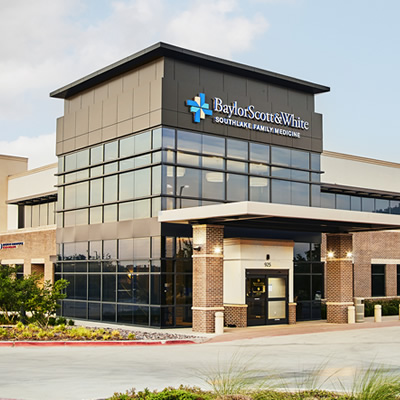
Baylor Scott & White Urgent Care - Southlake
925 E Southlake Blvd Ste 270, Southlake, TX, 76092
- Monday: 8:00 am - 8:00 pm
- Tuesday: 8:00 am - 8:00 pm
- Wednesday: 8:00 am - 8:00 pm
- Thursday: 8:00 am - 8:00 pm
- Friday: 8:00 am - 8:00 pm
- Saturday: 8:00 am - 8:00 pm
- Sunday: 12:00 pm - 5:00 pm

Lonestar Endoscopy Center - Keller
180 Bear Creek Pkwy , Keller, TX, 76248
- Monday: 5:00 am - 3:00 pm
- Tuesday: 5:00 am - 3:00 pm
- Wednesday: 5:00 am - 3:00 pm
- Thursday: 5:00 am - 3:00 pm
- Friday: 5:00 am - 3:00 pm
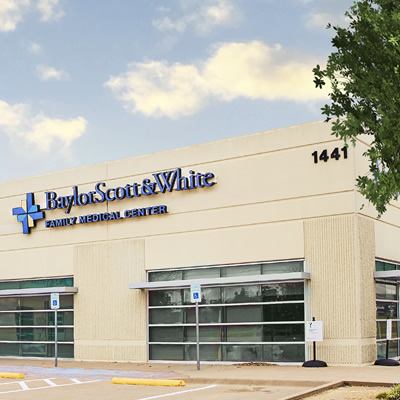
Baylor Scott & White Urgent Care - Midlothian
1441 S Midlothian Pkwy Ste 100A, Midlothian, TX, 76065
- Monday: 8:00 am - 8:00 pm
- Tuesday: 8:00 am - 8:00 pm
- Wednesday: 8:00 am - 8:00 pm
- Thursday: 8:00 am - 8:00 pm
- Friday: 8:00 am - 8:00 pm
- Saturday: 8:00 am - 8:00 pm
- Sunday: 12:00 pm - 5:00 pm

Baylor Scott & White Urgent Care - Fort Worth (Magnolia)
950 W Magnolia Ave , Fort Worth, TX, 76104
- Monday: 8:00 am - 8:00 pm
- Tuesday: 8:00 am - 8:00 pm
- Wednesday: 8:00 am - 8:00 pm
- Thursday: 8:00 am - 8:00 pm
- Friday: 8:00 am - 8:00 pm
- Saturday: 8:00 am - 8:00 pm
- Sunday: 12:00 pm - 5:00 pm

Baylor Scott & White Hillcrest Clinic - Bellmead
851 N Loop 340 , Waco, TX, 76705
- Monday: 8:00 am - 7:30 pm
- Tuesday: 8:00 am - 7:30 pm
- Wednesday: 8:00 am - 7:30 pm
- Thursday: 8:00 am - 7:30 pm
- Friday: 8:00 am - 7:30 pm
- Saturday: 8:00 am - 7:30 pm
- Sunday: 10:00 am - 5:30 pm

Baylor Scott & White Hillcrest Colorectal & General Surgery
50 Hillcrest Medical Blvd Ste 105, Waco, TX, 76712
- Monday: 8:00 am - 5:00 pm
- Tuesday: 8:00 am - 5:00 pm
- Wednesday: 8:00 am - 5:00 pm
- Thursday: 8:00 am - 5:00 pm
- Friday: 8:00 am - 5:00 pm

Baylor Scott & White Convenient Care Clinic - College Station
1700 University Dr E Entrance 16, Second Floor, Desk S, Side B, College Station, TX, 77840
- Monday: 8:00 am - 7:30 pm
- Tuesday: 8:00 am - 7:30 pm
- Wednesday: 8:00 am - 7:30 pm
- Thursday: 8:00 am - 7:30 pm
- Friday: 8:00 am - 7:30 pm
- Saturday: 8:00 am - 5:00 pm
- Sunday: 8:00 am - 5:00 pm
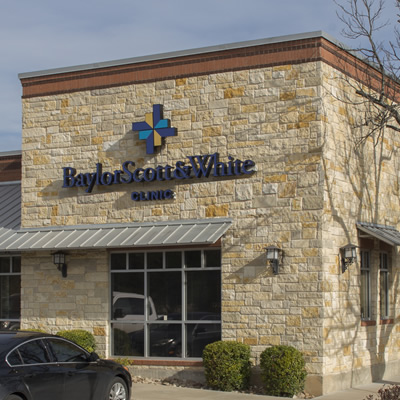
Baylor Scott & White Clinic - Belton Lake Road
309 Lake Rd , Belton, TX, 76513
- Monday: 7:00 am - 7:00 pm
- Tuesday: 7:00 am - 7:00 pm
- Wednesday: 7:00 am - 7:00 pm
- Thursday: 7:00 am - 7:00 pm
- Friday: 7:00 am - 7:00 pm
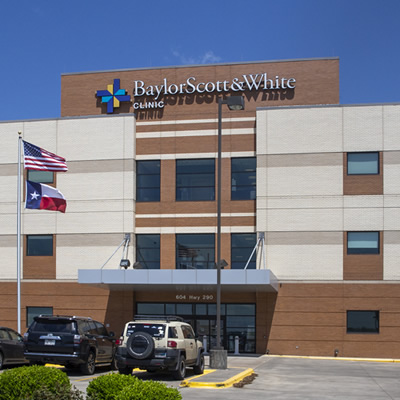
Baylor Scott & White Clinic - Brenham Hwy 290
604 US 290 , Brenham, TX, 77833
- Monday: 7:00 am - 5:00 pm
- Tuesday: 7:00 am - 5:00 pm
- Wednesday: 7:00 am - 5:00 pm
- Thursday: 7:00 am - 7:00 pm
- Friday: 7:00 am - 5:00 pm
- Saturday: 8:00 am - 12:00 pm
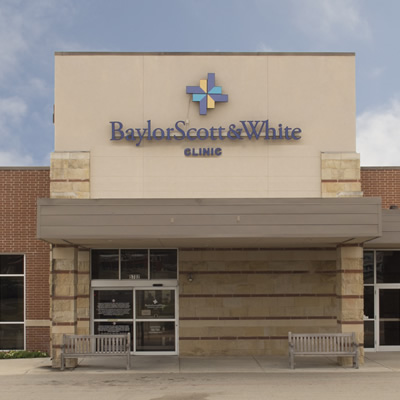
Baylor Scott & White Clinic - Killeen - Harker Heights
5702 E Central Texas Expy , Killeen, TX, 76543
- Monday: 7:00 am - 6:00 pm
- Tuesday: 7:00 am - 6:00 pm
- Wednesday: 7:00 am - 6:00 pm
- Thursday: 7:00 am - 6:00 pm
- Friday: 7:00 am - 5:00 pm
- Saturday: 8:00 am - 5:00 pm
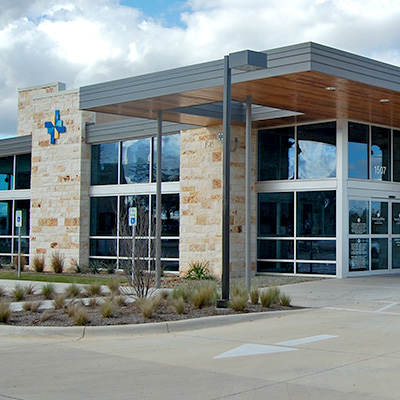
Baylor Scott & White Clinic - Georgetown Central
1507 Rivery Blvd , Georgetown, TX, 78628
- Monday: 8:00 am - 5:00 pm
- Tuesday: 8:00 am - 5:00 pm
- Wednesday: 8:00 am - 5:00 pm
- Thursday: 8:00 am - 5:00 pm
- Friday: 8:00 am - 5:00 pm
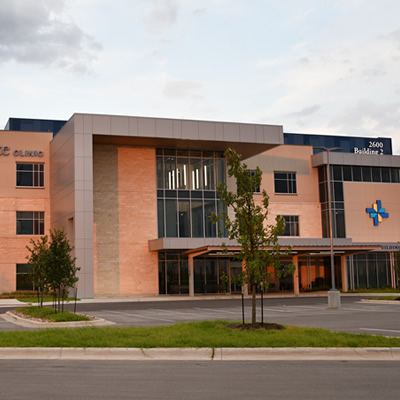
Baylor Scott & White Clinic - Pflugerville Medical Center Building 2
2600 E Pflugerville Pkwy Building 2, Pflugerville, TX, 78660
- Monday: 8:00 am - 5:00 pm
- Tuesday: 8:00 am - 5:00 pm
- Wednesday: 8:00 am - 5:00 pm
- Thursday: 8:00 am - 5:00 pm
- Friday: 8:00 am - 5:00 pm
- Monday: 8:00 am - 4:00 pm
- Tuesday: 8:00 am - 4:00 pm
- Wednesday: 8:00 am - 4:00 pm
- Thursday: 8:00 am - 4:00 pm
- Friday: 8:00 am - 4:00 pm
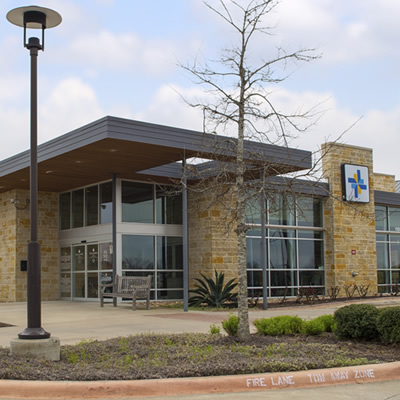
Baylor Scott & White Clinic - Pflugerville Central
1701 E Pflugerville Pkwy , Pflugerville, TX, 78660
- Monday: 7:00 am - 5:00 pm
- Tuesday: 7:00 am - 5:00 pm
- Wednesday: 7:00 am - 5:00 pm
- Thursday: 7:00 am - 5:00 pm
- Friday: 7:00 am - 5:00 pm
- Monday: 7:00 am - 4:00 pm
- Tuesday: 7:00 am - 4:00 pm
- Wednesday: 7:00 am - 4:00 pm
- Thursday: 7:00 am - 4:00 pm
- Friday: 7:00 am - 4:00 pm
- Saturday: 9:00 am - 12:00 pm
- Sunday: 9:00 am - 12:00 pm
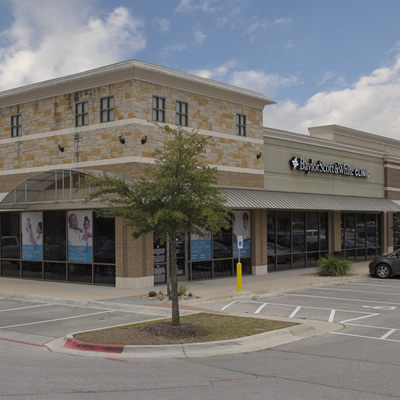
Baylor Scott & White Clinic - Austin Avery Ranch
10526 W Parmer Ln Ste 409, Austin, TX, 78717
- Monday: 8:00 am - 5:00 pm
- Tuesday: 8:00 am - 5:00 pm
- Wednesday: 8:00 am - 5:00 pm
- Thursday: 8:00 am - 5:00 pm
- Friday: 8:00 am - 5:00 pm
- Monday: 8:00 am - 4:00 pm
- Tuesday: 8:00 am - 4:00 pm
- Wednesday: 8:00 am - 4:00 pm
- Thursday: 8:00 am - 4:00 pm
- Friday: 8:00 am - 4:00 pm
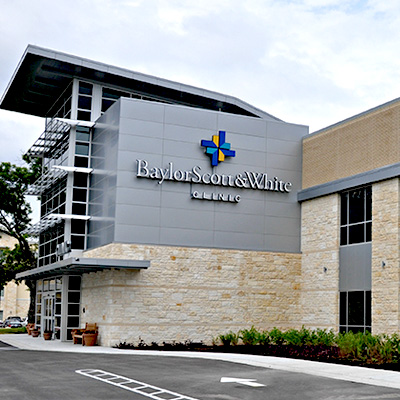
Baylor Scott & White Clinic - Cedar Park
910 E Whitestone Blvd , Cedar Park, TX, 78613
- Monday: 8:00 am - 5:00 pm
- Tuesday: 8:00 am - 5:00 pm
- Wednesday: 8:00 am - 5:00 pm
- Thursday: 8:00 am - 5:00 pm
- Friday: 8:00 am - 5:00 pm
- Monday: 7:00 am - 5:00 pm
- Tuesday: 7:00 am - 5:00 pm
- Wednesday: 7:00 am - 5:00 pm
- Thursday: 7:00 am - 5:00 pm
- Friday: 7:00 am - 5:00 pm
- Saturday: 9:00 am - 2:00 pm
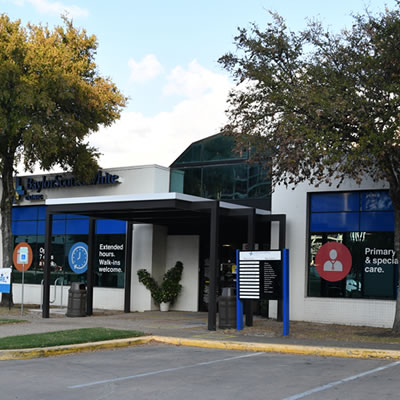
Baylor Scott & White Clinic - Austin North Burnet
2608 Brockton Dr , Austin, TX, 78758
- Monday: 8:00 am - 5:00 pm
- Tuesday: 8:00 am - 5:00 pm
- Wednesday: 8:00 am - 5:00 pm
- Thursday: 8:00 am - 5:00 pm
- Friday: 8:00 am - 5:00 pm
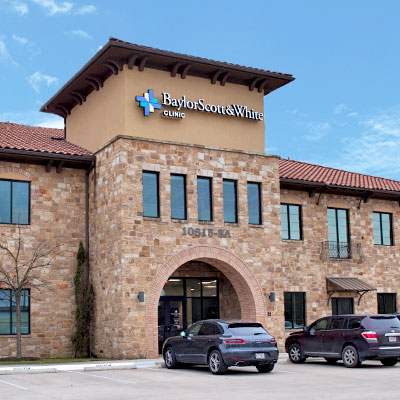
Baylor Scott & White Clinic - Austin River Place
10815 Ranch Rd 2222 , Austin, TX, 78730
- Monday: 8:00 am - 5:00 pm
- Tuesday: 8:00 am - 5:00 pm
- Wednesday: 8:00 am - 5:00 pm
- Thursday: 8:00 am - 5:00 pm
- Friday: 8:00 am - 5:00 pm
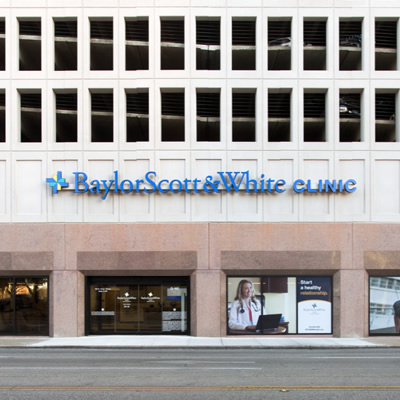
Baylor Scott & White Clinic - Austin Downtown
200 E Cesar Chavez St Ste G140, Austin, TX, 78701
- Monday: 8:00 am - 5:00 pm
- Tuesday: 8:00 am - 5:00 pm
- Wednesday: 8:00 am - 5:00 pm
- Thursday: 8:00 am - 5:00 pm
- Friday: 8:00 am - 5:00 pm

Baylor Scott & White Clinic - Austin Circle C
5000 W Slaughter Ln Building 6, Ste 100, Austin, TX, 78749
- Monday: 8:00 am - 5:00 pm
- Tuesday: 8:00 am - 5:00 pm
- Wednesday: 8:00 am - 5:00 pm
- Thursday: 8:00 am - 5:00 pm
- Friday: 8:00 am - 5:00 pm

Baylor Scott & White North Texas Colon and Rectal Associates - Odessa
420 E 6th St Ste 102, Odessa, TX, 79761
Frequently asked questions
-
How common is inflammatory bowel disease?<p style="text-indent: -0.25in; line-height: 150%; border-width: initial; border-style: none;"></p>
IBD affects an estimated 1.6 million people in the US. Although it can occur at any age, it is most often diagnosed in people between 15 and 35 years old.
-
Can coffee help treat inflammatory bowel disease?
Coffee doesn’t treat inflammatory bowel disease. While caffeine isn’t proven to make IBD worse, it can trigger symptoms like cramping or diarrhea in some people. If you notice it bothers you, try cutting back and talk with your doctor about what’s best for your symptoms.
